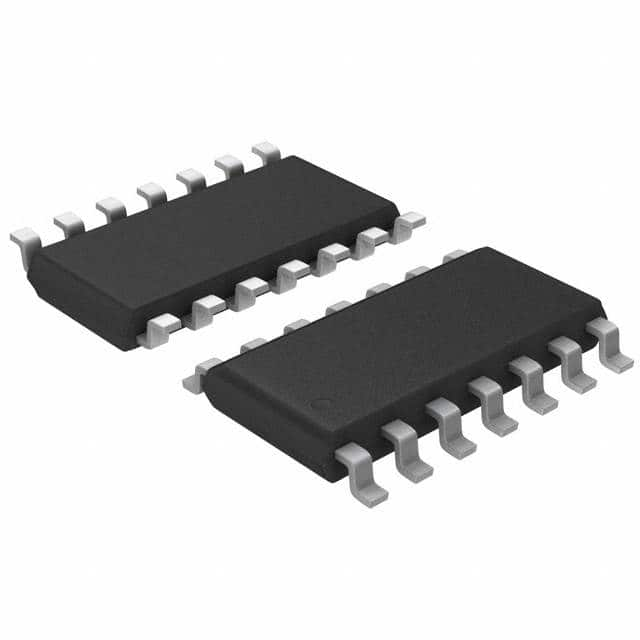74LCX04MX
Basic Information Overview
- Category: Integrated Circuit (IC)
- Use: Logic Gate Inverter
- Characteristics: Low Voltage, High-Speed CMOS Technology
- Package: SOIC (Small Outline Integrated Circuit)
- Essence: Hex Inverter
- Packaging/Quantity: Tape and Reel, 2500 pieces per reel
Specifications
- Supply Voltage Range: 1.65V to 3.6V
- Input Voltage Range: 0V to VCC
- Output Voltage Range: 0V to VCC
- Maximum Operating Frequency: 100MHz
- Propagation Delay Time: 2.5ns (typical)
- Input Capacitance: 3pF (typical)
- Output Current: ±24mA
Detailed Pin Configuration
The 74LCX04MX has a total of 14 pins. The pin configuration is as follows:
+---+--+---+
A1 -|1 +--+ 14|- VCC
A2 -|2 13|- A6
B1 -|3 12|- Y6
B2 -|4 74LCX04MX11|- Y5
A3 -|5 10|- Y4
A4 -|6 9|- Y3
B3 -|7 8|- Y2
+----------+
Functional Features
- Hex Inverter: The 74LCX04MX consists of six independent inverters, each capable of converting a logic level from high to low or vice versa.
- Low Voltage Operation: It operates at a supply voltage range of 1.65V to 3.6V, making it suitable for low-power applications.
- High-Speed CMOS Technology: The IC utilizes high-speed CMOS technology, enabling fast switching times and high-frequency operation.
- Wide Input Voltage Range: The input voltage range extends from 0V to VCC, allowing compatibility with various logic levels.
Advantages and Disadvantages
Advantages: - Low power consumption due to low voltage operation - High-speed operation for quick signal processing - Compact package size for space-constrained applications
Disadvantages: - Limited output current capacity - Restricted operating frequency compared to some other ICs
Working Principles
The 74LCX04MX operates based on the principles of complementary metal-oxide-semiconductor (CMOS) technology. Each inverter within the IC consists of a PMOS (p-channel MOS) transistor and an NMOS (n-channel MOS) transistor. When the input voltage is high, the PMOS transistor turns off, while the NMOS transistor turns on, resulting in a low output voltage. Conversely, when the input voltage is low, the PMOS transistor turns on, and the NMOS transistor turns off, leading to a high output voltage.
Detailed Application Field Plans
The 74LCX04MX finds application in various fields where logic inversion is required. Some specific areas of use include: 1. Digital Signal Processing: Inverting digital signals for data manipulation and processing. 2. Microcontrollers and Microprocessors: Logic level conversion and interfacing between different voltage domains. 3. Communication Systems: Signal conditioning and level shifting in communication protocols such as UART, SPI, and I2C. 4. Consumer Electronics: Used in devices like smartphones, tablets, and gaming consoles for signal inversion and level translation.
Detailed and Complete Alternative Models
Some alternative models that offer similar functionality to the 74LCX04MX are: - SN74LVC04A: Hex Inverter with 3.3V to 5V voltage compatibility. - CD4069UB: Hex Inverter with a wider supply voltage range of 3V to 18V. - MC74LCX04: Hex Inverter with similar characteristics and package options.
Note: The above alternatives are provided as examples and may not cover all available options in the market.
In conclusion, the 74LCX04MX is a hex inverter IC that operates at low voltages and high speeds. It finds application in various fields such as digital signal processing, microcontrollers, communication systems, and consumer electronics. While it offers advantages like low power consumption and compact size, it has limitations in terms of output current capacity and operating frequency. Alternative models with different specifications are also available for specific requirements.
Lista 10 Vanliga frågor och svar relaterade till tillämpningen av 74LCX04MX i tekniska lösningar
Sure! Here are 10 common questions and answers related to the application of 74LCX04MX in technical solutions:
1. What is the 74LCX04MX? The 74LCX04MX is a hex inverter gate IC (Integrated Circuit) that consists of six independent inverters.
2. What is the operating voltage range of the 74LCX04MX? The operating voltage range of the 74LCX04MX is typically between 2.0V and 3.6V.
3. Can the 74LCX04MX be used in both digital and analog circuits? No, the 74LCX04MX is specifically designed for digital circuits and is not suitable for analog applications.
4. What is the maximum output current of the 74LCX04MX? The maximum output current of the 74LCX04MX is typically around 24mA.
5. Can the 74LCX04MX be used as a level shifter? Yes, the 74LCX04MX can be used as a level shifter to convert signals between different voltage levels.
6. Is the 74LCX04MX compatible with TTL logic levels? Yes, the 74LCX04MX is compatible with TTL (Transistor-Transistor Logic) logic levels.
7. What is the propagation delay of the 74LCX04MX? The propagation delay of the 74LCX04MX is typically around 3.5ns.
8. Can the 74LCX04MX be used in high-speed applications? Yes, the 74LCX04MX is designed for high-speed operation and can be used in applications requiring fast switching times.
9. Does the 74LCX04MX have built-in protection against electrostatic discharge (ESD)? Yes, the 74LCX04MX has built-in ESD protection to prevent damage from electrostatic discharge.
10. Can the 74LCX04MX be used in battery-powered applications? Yes, the 74LCX04MX is suitable for battery-powered applications due to its low power consumption and wide operating voltage range.
Please note that these answers are general and may vary depending on specific datasheet specifications and application requirements.


